There’s a lot of history packed into this chart on Oregon’s vehicle trends: the seemingly relentless driving boom of the 1950s through 1990s; the decoupling of gasoline consumption from vehicle travel after the OPEC crisis and the economic downturn in the late 1970s; and, most recently, the peaking of both gasoline consumption and vehicle travel in the late 1990s and early 2000s, respectively.
But perhaps even more telling is the following chart, showing the same trends adjusted for population growth:
It’s sort of astonishing: measured per person, vehicle use on Oregon’s state-owned roads has fallen almost as fast over the last decade as it rose during the “driving boom.” Gasoline use per person is falling quickly too, due to a combination of reduced driving and improved efficiency.
To me, the implications are as profound as they are obvious: Oregon neither needs, nor can it afford, massive highway expansions. Oregonians are driving less, and any attempt to raise new transportation revenue from drivers—whether from tolls or from gas taxes—is likely to dampen demand even further. It would be nice if Oregon’s legislature agreed with me. But if Washington’s experience is any guide, convincing legislators that they don’t need a new, bigger highway can be an uphill battle.
Update: By email, a thoughtful commenter wondered if my comments above suggest that I oppose using tolls to raise transportation revenue. The simple answer: NO!! I think that well-designed tolls are an essential tool, both for managing demand and for raising revenue. But transportation planners should recognize that tolls will reduce the demand for driving. Just so, a smart tolling regime can even boost the capacity of roads, by limiting peak-hour traffic congestion. Transportation planners should carefully consider the effect of tolls as they’re designing roads—so that they don’t overbuild the roads for no good reason!


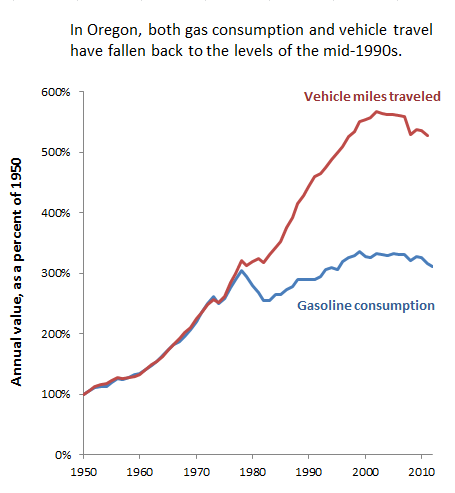
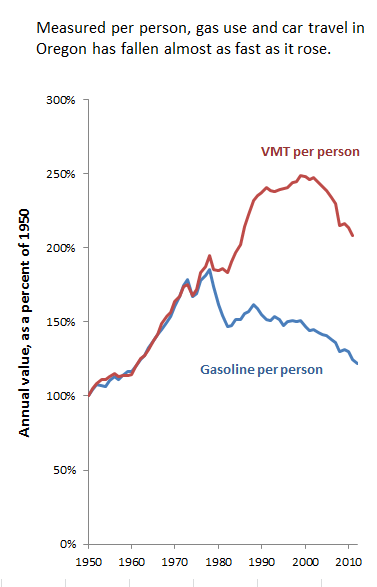

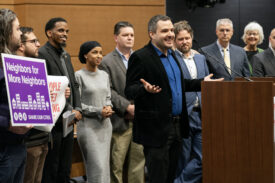
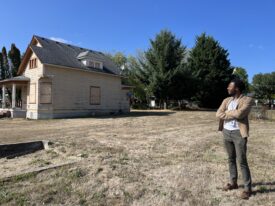
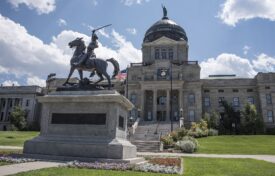


John Gear
Ah, but there you go, thinking rationally (rather than with your stickshift as God intended the American Male to do). Besides, the sprawl lobby doesn’t want tolls or higher gas taxes; as they see it, supporting CH2M-Hill and the other big gorillas in the Concrete Gang is what property taxes are for!
Here in Salem, the sprawl lobby is dancing faster than a vacuum cleaner salesman who has managed to get in the door and won’t take no for an answer; they will say absolutely anything at this point to win support for completing the DEIS, because they have every intention of getting the route approved in the DEIS for a “small, local bridge” and then, later, trying to beef it back up again to the proper size for Real American Highway Projects . . . displacing the brown and the poor to serve the Sprawl Lobby.
It would be laughable if it wasn’t so absolutely predictable and wasteful, complete with full-throated backing from the Chamber of Commerce arguing that all that pointy-headed data you geeks care about it just nonsense because we’re going right back to drive drive drive.
Elizabeth Graser-Lindsey
Without discussing tolls themselves, consider though that roads are the public means of connectivity. The improvement might need to be tolled, but the connectivity should not be prevented. Therefore it seems that if roads are to be tolled, there must be alternative means of connectivity even if they are unimproved (or are a different mode of transportation). With the transportation system so focused on automobiles, it is hard to remember that bikes and pedestrians (etc.) are effectively blocked in many portions and that they should have a right to uninhibited and untolled (even if unimproved) connectivity.
Paul Edgar
Some people sprawl is to me more of an opportunity to re-erect communities, with greater planning, self contained with local job base. What we have been doing is centralizing jobs. The basic nature of new families is to set out and establish heir nest and to many is not in some low quality high density world. So to me, what is happening is a supply and demand world, with little though to its impacts. Supply Chain Management, in this tangled web, has many different legs. But to simply this discussion without tracing out each leg of the web, in my mind is the absolute need decentralizing employment to accomplish less trips. When we open up opportunities where employment centers can get closer to sprawl areas, this can create win – win conditions. With these employment centers, our transportation infrastructure needs are much easier to quantify. Heavy Rail could eliminate thousands of truck trips, in this Supply Chain World. Passenger Rail could inter-connect these sprawl clusters. Just everything has to be looked at in how we reduce these vehicle miles driven. It is in this intelligent mix, of understanding what the next generation wants, but with a little guidance, toward being smarter. Oregon is this place where people want to live, we will expand. We just need forthright – responsible thinkers, that appreciate what attracts this expansion and get our heads around the JOB – Component – Employment Centers and how we match up this expansion in population with de-centralizing where these jobs are.
Tom Lane
Gasoline consumption has decreased due to better mileage. VMT’s have decreased due to Oregon’s severe recession, with very high unemployment rates in most counties, into the double digits – much worse than Washington. And, many people are working part time, who were once working full time.
Oregon’s population grows very slowly, due to the anti-business attitude from state leaders, a high tax on high income earners, high business taxes, and also strict urban growth boundaries that raise the cost of living. It is expensive to move to Oregon or Washington if you are single, due to the cost of living. Oregon Salaries are much lower than Washington or California.
CHM2-Hill is on our side as environmentalists. Take a look at what they did with the new I-580 between Reno and Carson City. They designed artistic rock formations along the sides of the freeway, making the freeway blend into the surrounding mountains (old volcanic mountains of the Eastern Sierra).
The sprawl lobby certainly includes members of the American Dream Foundation, Cato Institute, Demographia, and others. There is also a Smart Growth lobby. I’m in botany and landscape architecture and would prefer that both sides would just go away.
Landscape architects, if given the chance, can design beautiful and sustainable low density sprawl that blends in with the environment, on half acre lots, with preservation of native vegetation. Take a look at Orinda and Lafayette, California – large lots, native oaks, and dozens of bird species, deer, and wild turkeys. Or, south suburban Reno, where the high desert vegetation has been preserved on 1 to 5 acre lots, with hiking trails nearby in the Eastern Sierra.
Clark Williams-Derry
Gasoline consumption has decreased mostly due to reduced VMT, and only secondarily because of better mileage. I estimated last year that the per-capita gasoline reduction from 1999 through 2011 was about 87% attributable to less driving per person, and 13% to better gas mileage. For much of that time, the vehicle fleet actually was not growing more efficient — it was the SUV boom. It wasn’t until 2009 or thereabouts that the average new vehicle was more efficient than a vehicle it was replacing, at least on paper.
I agree that the recession and slow population growth have affected the trends, but driving started to level out and even decline well before the recession hit. You just can’t blame the 2008 recession for a trend that started in the 1990s. And the flat-lining of traffic occurred even during the housing boom, when unemployment was low and consumer spending was high.
Tom Lane
Oregon’s population growth is now less than 1% each year. While natural births and deaths have remained constant 2000-2009, immigration to the state declined every year. From 2000 to 2009, population in Multnomah County (Portland) and Lane County (Eugene) only increased by 10%. Coimpare this to Deschusets County (Bend) at 50%. Whenever a “resort” county such as Deschusets Co. grows faster than a “manufacturing” county such as Multnomah, it’s a recipe for unemployment, especially in Northwest Oregon (Portland to Eugene). Oregon’s DCLD, TGM, DEQ, and related environmental agencies, would be better served to create jobs, rather than worry about GHG’s and VMT’s. Even Bend, with 50% population growth in 10 years in clean air, has double digit unemployment. Gasoline consumption should go down, however, in Oregon this has been at the expense of the middle class losing their jobs. Perhaps Oregon should repeal various taxes to encourage more jobs? Could Medford or Bend become the next Silicon Valley?
Cave Johnson
Tom, your post is not responsive. The point of the article and the reply is, that with or without population growth, VMT per-capita is declining.
Your reply is that we should be growing faster and presumably more lax environmental standards would cause that to occur. Perhaps a worthy topic of conversation, but not the one we are having right now.
Now for my two bits on tolls: Tolls are perhaps a part of the solution to the transportation revenue problem, but I think the take away is that we should not make big bets that we can use them to fund a big portion of new projects. The above data suggests there are structural, not cyclical, factors depressing VMT per-capita and that we need to account for them seriously in our thinking about what we need.
A state that is over-invested in unneeded legacy systems that do not produce a cost-effective return on investment will not be one that is economically competitive.